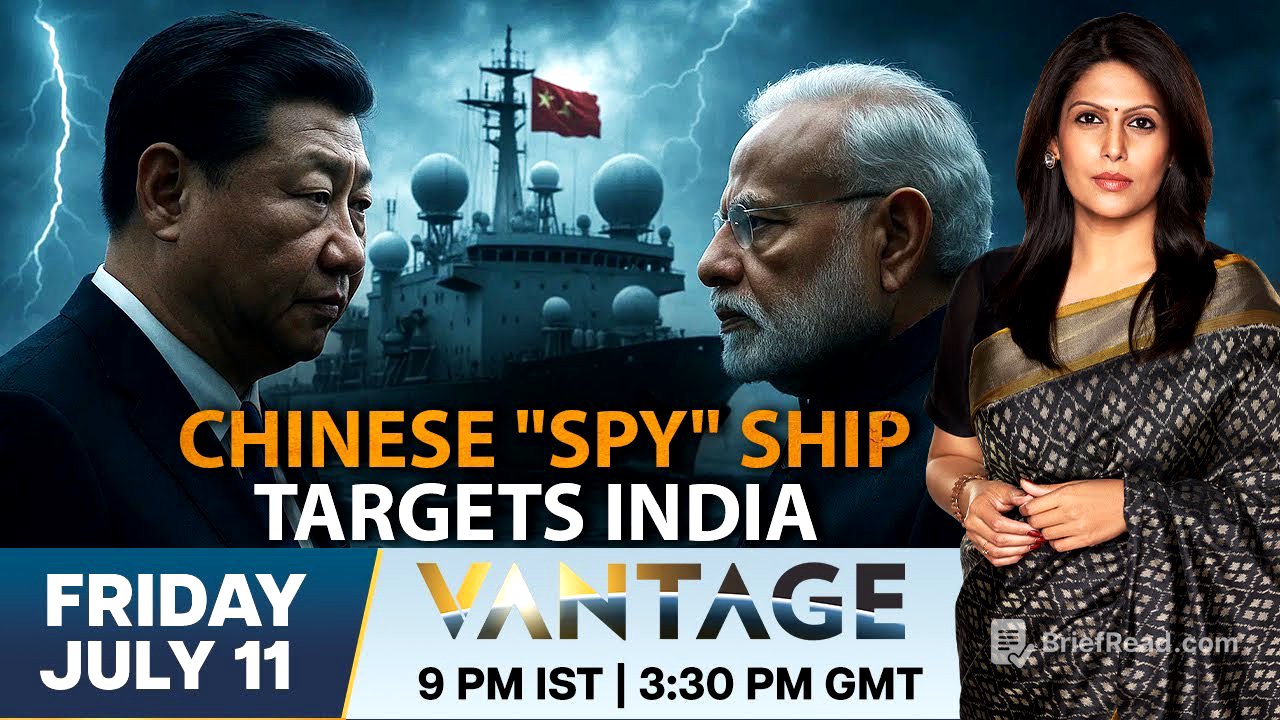TLDR;
This Vantage episode covers a range of global and domestic issues. It starts with China's increasing naval activity near India, then moves to Donald Trump's new tariffs on Canada and other countries. The episode also discusses the rising power of a new group challenging Hamas in Gaza, the increasing debt among Indians due to "buy now, pay later" schemes, and the FBI's use of lie detector tests to check employee loyalty. Finally, it touches on the monsoon-related problems in Indian cities, the intense competition for AI talent in Silicon Valley, the benefits of exercise for a longer life, and the impact of climate change on sports.
- China's naval activities near India are raising concerns about surveillance and strategic intent.
- Donald Trump's tariffs on Canada and other nations are creating economic uncertainty and testing international relationships.
- A new group in Gaza, supported by Israel, is challenging Hamas's control, potentially leading to a shift in power dynamics.
- Increasing debt among Indians, driven by easy access to credit and lifestyle loans, is becoming a significant economic issue.
- Climate change is affecting sports, with heat waves and changing weather patterns impacting playing conditions and events.
Chinese Spy Ship near India [2:07]
A Chinese spy ship was caught snooping near India, disguised as a research vessel. A French intelligence firm tracked around 1,900 ships in the Bay of Bengal and found that 10% had turned off their AIS (Automatic Identification System) to avoid tracking. One Chinese vessel stood out because it was sailing close to Indian military zones. The French assessment suggests the ship was mapping the seafloor and identifying submarine corridors, which could be used in case of a war. China has been deploying warships and submarines in the Indian Ocean for years, opening an outpost in Djibouti in 2017 and increasing the number of drills in the region.
China's End Goal and India's Response [8:29]
China's goal is to project power in the Indian Ocean, secure their supplies, and surround India. The Indian Ocean is a key choke point for China, carrying around 80% of their oil. For India, a lot is at stake, as 95% of India's trade is seaborn, and almost all of its oil comes through the Indian Ocean. India's naval bases are spread across its coastline, and it needs to guard these assets from attacks and surveillance. To tackle Chinese ambitions, India needs to build a larger naval fleet and reaffirm its role as the net security provider in the Indian Ocean through initiatives like SAGAR (Security and Growth for All in the Region).
Trump's Tariffs on Canada [13:41]
Donald Trump is imposing 35% tariffs on Canada, citing the fentinel crisis as the reason. He claims that Canada, Mexico, and China have failed to stop the flow of fentinel into the US. Canada denies any role and insists it is committed to trade talks, but Trump's actions are creating uncertainty. Since Monday, Trump has issued 20 such letters, impacting countries like Japan and South Korea with a 15 to 20% levy. Trump's trade policy is seen as a loyalty test, using tariffs as bargaining chips.
Impact of Trump's Trade Policies [16:12]
Trump's trade policies are not about trade but about control, and no one is winning this game. Countries are trying to navigate this by negotiating, playing the long game, or bracing for a trade war. Trump's tariff tsunami is creating a tangled web of supply chains and mutual dependencies, and unraveling it is dangerous.
New Group Challenging Hamas in Gaza [19:03]
In Gaza, a new group called the Popular Forces is challenging Hamas, with some reports suggesting they have Israeli support. Hamas has lost control over 80% of Gaza, and multiple gangs have emerged. The Popular Forces, led by Yaser Abu Shahab, aims to end Hamas rule. Israel is propping up this group, similar to past strategies in Lebanon and Gaza, to create new power centers and weaken rivals.
Risks and Potential Outcomes in Gaza [21:23]
This plan carries risks for both sides. For Israel, there's a risk of repeating past mistakes and creating another Hamas. For the Popular Forces, the risk is domestic, as Israel is seen as public enemy number one in Gaza. A ceasefire would give Hamas time to regroup, while continued conflict would further weaken them.
Increasing Debt Among Indians [23:24]
Being in debt is becoming normalized in India, with people increasingly using loans for lifestyle purchases. The fintech boom has powered this trend, making loans easily accessible through BNPL (Buy Now Pay Later) plans. Household debt has soared to 42% of the GDP, with unsecured debt like credit cards and BNPL schemes growing fast. As of 2025, 11% of small borrowers have already defaulted.
Managing Debt and Lifestyle Choices [25:51]
The problem arises when people confuse their wants with their needs, borrowing money for luxuries like iPhones and beauty treatments. To manage debt, it's important to track EMIs, cap the EMI burden at 40% of income, start a rainy day fund, invest slow and steady, and say no to lifestyle loans. The good life is not about what you borrow but about what you build.
FBI's Loyalty Tests [28:02]
The FBI is using lie detector tests on its employees to test their loyalty to the FBI director, Cash Patel. This is in addition to the typical uses of polygraph tests for job applicants, officers who betray their country, and those who cannot be trusted with critical secrets. Critics call this move politically charged and inappropriate, especially given the Trump administration's tightening grip on the FBI.
Global Trends in Loyalty Tests [31:43]
The US is not an isolated case, as China and Taiwan have also used lie detector tests to ensure loyalty. In North Korea, people sign loyalty oaths to their leader. This shows that many leaders, from democracies to dictatorial regimes, share trust issues.
Monsoon Problems in Indian Cities [32:27]
Indian cities are facing monsoon nightmares with endless jams, water logging, and luxury villas turning into Venice. This is not new, yet the headlines still manage to surprise us every year. We've normalized flooding and romanticized inconvenience. Despite paying property tax, road tax, and toll tax, cities are slowly drowning in negligence.
Coping with Monsoon Chaos [36:01]
When roads melt and bridges collapse, people send WhatsApp forwards, upload videos, call their plumber, and move on with their lives. Overpriced apartments now come with a waterfront view, but it's important not to ask if it is covered under maintenance.
Silicon Valley's Talent War [36:39]
Tech giants like Meta, OpenAI, Google, Microsoft, Apple, and Amazon are competing for AI dominance and poaching top talent with multi-million dollar offers. Meta CEO Mark Zuckerberg has a group chat called "recruiting party" where they discuss potential recruits and propose offers. This recruitment race is heating up as companies invest billions of dollars into research and introduce new products at breakneck speed.
Exercise for a Longer Life [40:18]
Exercise is the elixir of a long life, reducing the risk of early death by up to 40%. Age does not matter, and starting exercise at an older age also increases longevity. Exercise is good for the body and the mind, improving sleep, blood pressure, strength, mobility, confidence, memory, and mood. It prevents a range of diseases from cancer to diabetes, anxiety, and depression.
How Much Exercise is Enough [43:36]
At least 150 minutes of moderate intensity or 75 minutes of vigorous intensity throughout the week is enough. This reduces the risk of heart disease by 40% and the risk of cancer by 25%. Depending on your age, you can switch things up. The key is to exercise with intention, and the result will most likely be a longer, healthier life.
Climate Change Impact on Sports [44:39]
Climate change and heat are affecting sports. At Wimbledon, players are complaining of slow bounce due to the grass drying out. At Lord's cricket ground, the pitch is dry instead of green. Higher temperatures increase the risk of heat exhaustion, dehydration, and heat stroke. Winter sports are also at risk due to the lack of snow. Football faces the threat of flooded stadiums. While players will adapt, it's our planet we should be worried about.








